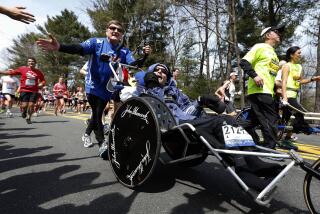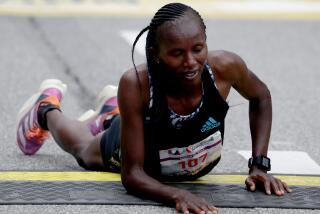Lebow, 62, Dies; Guru of Running
- Share via
NEW YORK — Fred Lebow, a pioneer in the running boom of the 1970s who built the New York City Marathon from a run in the park to a citywide event watched by millions, died Sunday after a second bout with brain cancer. He was 62.
Lebow, who died at his Manhattan home, had been treated as an outpatient at Memorial Sloan-Kettering. He was first diagnosed with brain cancer in 1990; the next year, he underwent surgery for thyroid cancer.
At one point, he was told he had six months to live. But he rallied, the disease went into remission and he completed the 1992 New York City Marathon to the cheers of thousands.
“I think I’m the healthiest cancer patient they’ve ever had,” he said.
The cancer recurred this year.
“In running, it doesn’t matter whether you come in first, in the middle of the pack or last,” he said. “You can say, ‘I have finished.’ There is a lot of satisfaction in that.”
Allan Steinfeld, president of the New York Road Runners Club, said a tribute will be held at the marathon finish line in Central Park on Wednesday.
He said staff, board members, sponsors, city officials and volunteers will join hands and cross the finish line together in a “symbolic promise to carry on Fred’s dream, the five-borough New York City Marathon, far into the future.”
The 25th New York City Marathon will be Nov. 6.
“We are prepared and committed to continue the rich legacy of Fred’s ideals, promoting health, fitness, competition and community service,” Steinfeld said. “Fred has left a grand heritage, and we will honor his memory by promoting his goals and realizing his visions.”
Lebow first started running to improve his stamina for tennis. The love of tennis eventually gave way to the love of running.
He founded the New York City Marathon in 1970. The first race, a four-loop circuit around Central Park, attracted only 127 runners. Lebow placed 45th out of the 55 finishers.
Tom Fleming, who won the race in 1973 and 1975, said Lebow persisted in his bid for a five-borough event, and city officials finally relented.
“It was a hard thing to convince the city to do, but his talent basically was that he could always convince people to do what was best for running,” he said.
Now the race attracts more than 25,000 runners, and many thousands more are turned away.
More to Read
Sign up for Essential California
The most important California stories and recommendations in your inbox every morning.
You may occasionally receive promotional content from the Los Angeles Times.










